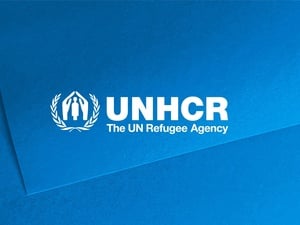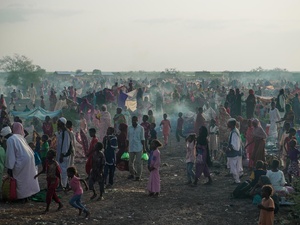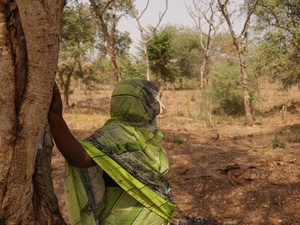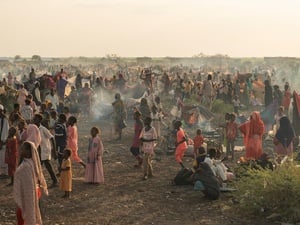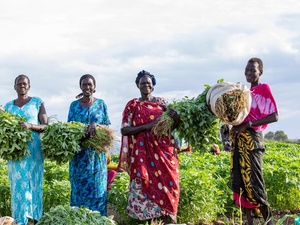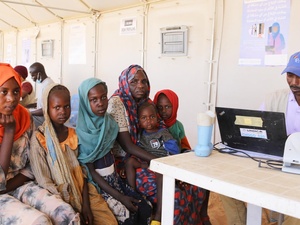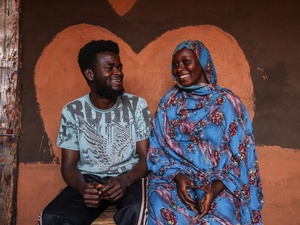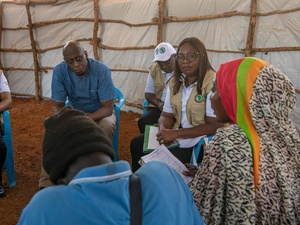Chad: High Commissioner to visit
Chad: High Commissioner to visit
High Commissioner Ruud Lubbers is scheduled to travel to Chad on Sunday to get a first-hand look at our ongoing efforts to help an estimated 110,000 Sudanese refugees. The High Commissioner is particularly interested in ensuring that UNHCR and its partners receive the necessary international support for what we have termed an "invisible emergency."
In N'Djamena, Mr. Lubbers will meet with the Minister of Foreign Affairs and the Minister of Administration du Territoire, as well as with heads of UN agencies and NGOs. He will also spend time with UNHCR staff before flying to the eastern town of Abéché, 850 km from the capital, where we have a field office. While in the east, Mr. Lubbers will visit the recently constructed site at Farchana, 55 km the border. A total of 1,810 Sudanese refugees have so far been relocated from insecure border areas to the much safer Farchana camp. We are moving an average of 200 people per convoy to Farchana twice a week. Starting next week, there will be three convoys a week.
If conditions allow, the High Commissioner will also visit other sites in the east before returning to N'Djamena on Tuesday (March 2). Back in the capital, he is scheduled to meet with various government officials, including President Idriss Deby.
Meanwhile, a UNHCR team came back this weekend from a second assessment mission to the northern part of the affected border area around Bahai and Bamina, where local authorities estimate 26,000 refugees are located. Our team and the Chadian authorities started registering the refugees for relocation in the near future. Over three days, they registered 3,000 people, and registration will continue this week. Refugees are scattered in four main locations in the region: in Bahai and Bamina and in two villages to the north of Bahai. Refugee leaders told UNHCR that people crossed in to Chad in the last week of January and the first week of February, following attacks by militia and bombing of villages north of Tine-Sudan.
Our teams report that the refugees are living along the river bed, where they can find water. A nurse from the health centre in Bahai reported many cases of dysentery, diarrhoea and respiratory infections at the beginning of February among the refugees, especially among children and old people. Most received some medicine at the beginning of this month. MSF-Belgique [Médecins Sans Frontières] has a mobile clinic operating once a week between Bahai and Bamina, and serious cases are referred to their medical centre in Tine.
At the same time, planes continue to shuttle between Mwanza, Tanzania, and Abéché, Chad, in our emergency airlift of 256 tons of blankets, plastic sheeting, kitchen sets and other relief items for the 110,000 refugees in eastern Chad. The next flight should arrive in Abéché tomorrow and three more are planned for the following days.
Another plane arrived this weekend in Abéché, with 45 tons of water equipment for our partner NCA (Norwegian Church Aid), including water pumps and pipes, bladders, generators, and rubbhalls. The equipment will be transported to Iriba and Guéréda on 12 trucks from the Red Cross. Once installed at the refugee camps, the equipment will guarantee water pumping and distribution for 40,000 people. At the same time, teams from NCA are preparing the ground to drill for water in Touloum. Additional equipment for drilling is scheduled to arrive in Abéché at the end of this week. NCA is also preparing a new camp at Mile, 25 km north-west of Guéréda, which will be the fourth camp set up in the region.
Yesterday, UNHCR started to move refugees from around Birak to Kounoungo transit centre, the third camp established in eastern Chad. UNHCR and Chadian authorities had reached out to the refugees to let them know that they can be moved to a safer site where they can get regular assistance. Although 150 refugees had registered to be part of the first convoy on Sunday, only 88 showed up. Just over a dozen came out for the convoy on Monday. The refugees explained to UNHCR that they changed their minds about moving because of strong family links in Birak. Most of the refugees have relatives in Birak and do not want to be separated from them. Given the low numbers, we will go today to other locations, especially around Guimeze, where refugees have expressed a strong desire to be relocated to a safer site.
Touloum, the second camp in the area, now shelters 4,666 refugees, including 1,480 who came on foot after hearing that they could get water and assistance at the site. Convoys to Touloum from Tine are temporarily on hold to allow us to finish registering the refugees who arrived on their own.
In light of the tens of thousands of new refugees arriving in eastern Chad since late last year, UNHCR has revised its budget for the Chad emergency to $20,782,000 for 2004. So far, we have received only $1,050,137 for the 2004 operation.


